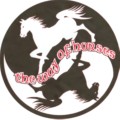
CRIBBING OR CHEWING? Eleanor Richards Copyright © 2004 How do I know if my horse is cribbing or chewing? He's destroying the wood in his stall. Observe your horse. If he clenches the edge of an object - such as a board or his feed tub with his front teeth, arches his neck and then appears to suck air - he is cribbing. You can usually hear a grunting noise which can sound like a burp or belch. When a horse chews wood - that is what he is doing. He will splinter the wood with his teeth. Sometimes the small pieces are dropped and sometimes swallowed. What causes a horse to crib? Research continues as to why horses crib. A few theories follow: 1. Learned behavior. It has been a belief horses can learn to crib from a stable mate who cribs. Recent research has proven this theory to be untrue. Researchers during this study decided it was management practices which caused horses in a particular environment to start cribbing. 2. Confinement. Horses prefer to roam and interact with other horses. Confining horses in a 12 x 12 stall with no other equine contact and little exercise can lead to the development of vices such as cribbing. 3. Lack of roughage in the diet. Horses need forage (hay or grass). They have a need to chew; their digestive system needs long-stem fiber to work properly. Boredom and digestive up-set can lead to cribbing. 4. Over-feeding concentrates. When there is a shortage of good quality forage or the horse needs more nutrition than the forage can provide concentrates are sometimes fed in excess. The horse's digestive system is designed to utilize long-stem fiber - not the starch and sugars which are present in grain or most commercial feeds. 5. Ulcers. This is the most recent theory about why horses crib. Stress, confinement, poor diet, or medication can cause an acidic environment in the stomach. It is thought cribbing stimulates salvia production which buffers the acid in the stomach. I just moved my horse to a stable where there is a horse that cribs. How can I prevent my horse from picking up the habit? Find out if the horse learned to crib at that stable or already cribbed when he was moved there. If he learned the habit at the current stable observe the management practices. Do the horses get plenty of turn-out time? Do they have hay available at all times? Do they have a chance to interact with other horses? Are the horses receiving too much grain or concentrate at a single meal? If the horse at your stable already cribbed before he came to the facility, if no other horses at the stable have the habit, and the management practices have the horse's well-being as the number one priority I would not worry. I bought a horse that cribs. What can I do? I would have him examined to rule out ulcers. Cribbing horses with ulcers that were treated with an antacid decreased the amount of time spent cribbing. Make sure your (or the stable) management practices are horse-friendly. Turn him out as much as possible, provide plenty of good quality forage, keep his stress level down, provide equine companionship, and do not feed large amounts of grain or concentrates. Don Blazer, world renowned trainer and author, recommends the cribber's hay be scattered around his stall or pen. This simulates the natural grazing environment and causes the horse to move around searching for food. Don also feeds the cribber's grain on his hay, so the cribber spends more time hunting for his feed, and he uses his lips and mouth in a more natural way. A great product to use for this is Buckeye Nutrition's Wrangler Cubes. It contains some roughage and can make up for the lack of nutrients in poor quality hay. There are surgical techniques available which have been used with varying degrees of success. Check with your veterinarian. Cribbing straps and collars are available. They try to prevent cribbing by making the horse uncomfortable using pressure. Many horses can crib even while wearing the device. Trying to stop cribbing by using surgery, straps, collars, electric shocking devices, or beating the horse when he cribs are methods humans have tried to make the horse adapt to our way of life. These devices are used because it takes less effort than attempting to change management practices and provide the horse with what he needs. What do I do if my horse is chewing, but not cribbing? Chewing can be caused by many things: boredom, lack of fiber in the diet, and lack of minerals or salt. You need to examine your management practices. Is the horse getting enough exercise? Does he have good quality forage available? Are you providing a balanced diet? Does he have access to free choice loose white salt? Many of the suggestions used to prevent or decrease cribbing will also do the same for a horse that chews. Farnum has recently introduced a product called "Quitt"™. The formula contains essential vitamins, micro and macro minerals, and fatty acids in a pH balanced alfalfa pellet. This product may help a horse if he is chewing because of nutritional deficiencies. Farnum still recommends the horse is provided with plenty of regular exercise and good quality forage. * Proper nutrition and management practices can prevent many problems associated with caring for horses. You can learn how to provide your horse with a better life-style by taking the online course "How to Feed for Maximum Performance" taught by Eleanor Richards. Go to www.horsecoursesonline.com for more information. Learn about micro and macro minerals, why the pH balance is important to a horse's digestive system, and much more. |


THE WAY OF HORSES |